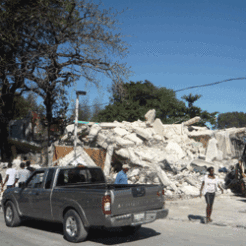The aid effort in Haiti hasn’t gone exceptionally well.
The fundraising effort of the DEC has been doing brilliantly, the efforts of a seven-year-old who cycled around his local park has been similarly spectacular (£165k and counting), but no one would claim that Haitians have got the kind of response any human being would hope for in such a situation.
However, last week’s editorial in the Lancet attacking aid agencies for “jostling for position”, “acting according to their own best interests” and being “obsessed with raising money” was really an attack on Big Charity rather than the relief effort itself – which has been hampered by the devastation of the Haitian government’s own mechanisms and destruction of the UN command in the country.
The Lancet makes some fair points, about the way that the international community places natural disasters above man-made ones higher up the ‘disaster’ hierarchy; the myopic focus on Haiti ‘right now’ as opposed to over the last decades of slow-burning ruin; that aid agencies should be subject to scrutiny.
But underlying its criticism is that aid agencies have become too big. It says that large aid agencies have become “polluted” by the kind of “unsavoury characteristics” associated with large corporations. Small, grassroots charities, it argues, are likely better placed to respond to such crises. It says that the aid sector has become an industry in its own right – and we all know industry is bad, bad, bad.
Never mind that in the UK, the DEC has launched an umbrella appeal, bringing the 13 biggest aid agencies under one unified message, thus limiting the “jostling”.
It is true that aid agencies are doing everything they can to raise money. It’s true that they are large and bureaucratic. It is true that within that there will be some ‘big corporate’ structures seeping their way into institutions that many people would like to imagine are still run by ragged volunteers working in abandoned warehouses on 1992 computers.
But big is not bad. Big is complicated, but in situations like Haiti big is a necessary complication. The scale of a disaster needs to be matched by scale of organisation.
There is definitely a place for these small grassroots organisations the Lancet pines after, but how does Maria Normal in Sheffield support an orphanage run by a few nuns outside Port-au-Prince if not via a megalithic entity like an international NGO.
The "aid industry" should not escape scrutiny and criticism. Being professional and big is not the cause of charities not responding to the crisis adequately. Things, as ever, are more complicated than that.
Lancet's Haiti relief effort attack reeks of anti-big charity bias
27 Jan 2010
Voices
The DEC fundraising effort has been brilliant, the efforts of a seven-year-old who cycled around his local park has been similarly spectacular, but no one would claim that Haitians have got the kind of response any human being would hope for in such a situation.









